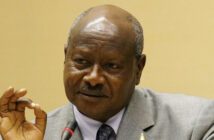JPMorgan Chase is to exclude Nigeria from its local-currency emerging-market bond indexes tracked by more than $200 billion of funds, after restrictions on foreign-exchange transactions prompted investor concerns about a shortage of liquidity.
The first phase of removing Africa’s biggest economy from the Government Bond Index-Emerging Markets, or GBI-EM, will take place at the end this month followed by a full exit by the end of October, the New York-based lender said in a statement sent to Bloomberg on Tuesday by spokesman Patrick Burton.
Nigeria’s central bank under Governor Godwin Emefiele introduced several foreign-exchange trading restrictions from December to stem the drop of the naira amid weaker oil prices. The country is Africa’s largest producer of crude, which accounts for about 90 percent of exports and two-thirds of government revenue. JPMorgan placed Nigeria on index watch in January, saying the foreign-exchange measures made it more difficult for foreign investors to replicate the gauges.
The country will “lose a significant chunk of regular portfolio inflows,” Gareth Brickman, a market analyst at ETM Analytics NA LLC in Stamford, Connecticut, said in a e-mailed note on Wednesday, estimating that more than $3 billion of Nigerian bonds will need to be sold. “The pressure will most certainly be back on the bank to allow the official naira rate to be at a lower, more sustainable level. Whether this comes with a more liberalized foreign-exchange regime is now anyone’s guess.”
Nigeria will not be eligible for re-entry for at least 12 months from the date of exclusion, JPMorgan said. The country has a 1.5 percent weighting in the biggest GBI-EM index, which is tracked by $183.8 billion of funds, according to the bank.
“Investors who track the GBI-EM series continue to face challenges and uncertainty while transacting in the naira due to the lack of a fully functional two-way FX market and limited transparency,” JPMorgan said in the statement. “As a result, Nigeria will be removed.”
The naira weakened 20 percent to a record low of 206.32 per dollar in the year through Feb. 12. Extra curbs introduced by Emefiele after that slashed trading in the interbank market and have seen the currency stabilize at an average of 198.93 since the beginning of February.
“We would like to strongly disagree with the premise and conclusions upon which the decision rests,” Ibrahim Mu’azu, a spokesman for the Abuja-based central bank, said in a statement on Tuesday. Nigeria has already introduced an order-based, two-way foreign-exchange market to stabilize the naira and limit speculation, according to the statement. “Despite these positive outcomes, JPMorgan would prefer that we remove this rule; even though it is obvious that doing so would lead to an indeterminate depreciation of the naira,” Mu’azu said.
Emefiele repeatedly said that Nigeria wanted to remain in the indexes and that there’s enough liquidity in the currency market for foreigners to buy and sell naira bonds. Average yields on those securities rose 11 basis points to 16.04 percent on Sept. 7, the highest among 18 countries included in the GBI-EM indexes, according to data compiled by Bloomberg.
“This will place additional pressure on the currency and even more upward pressure on domestic yields,” Stephen Bailey-Smith, head of Africa strategy at Standard Bank Group Ltd., said by phone from London.
Nigeria became the second African country after South Africa to be listed in JP Morgan’s emerging government bond index, in October 2012 after Emefiele’s predecessor, Lamido Sanusi, removed a rule that foreign buyers of naira bonds had to hold them for at least a year. Foreign holdings of the country’s local debt surged as a result to a peak of about $11 billion in 2013 before falling to $3 billion today, Samir Gadio, head of Africa strategy at Standard Chartered Plc., said by phone from London.
The exclusion hurts Nigeria just as President Muhammadu Buhari, in power since May, prepares to announce his cabinet, according to Ronak Gopaldas, head of country risk at Rand Merchant Bank. Buhari said he would have ministers in place by the end of the month.
“The move is a big blow to the country’s prestige and will result in negative market sentiment and capital outflows,” Johannesburg-based Gopaldas said in an e-mailed response to questions. “The performance of the currency, stock market as well as yields on the country’s debt are all expected to be adversely affected.”
Source: Bloomberg



